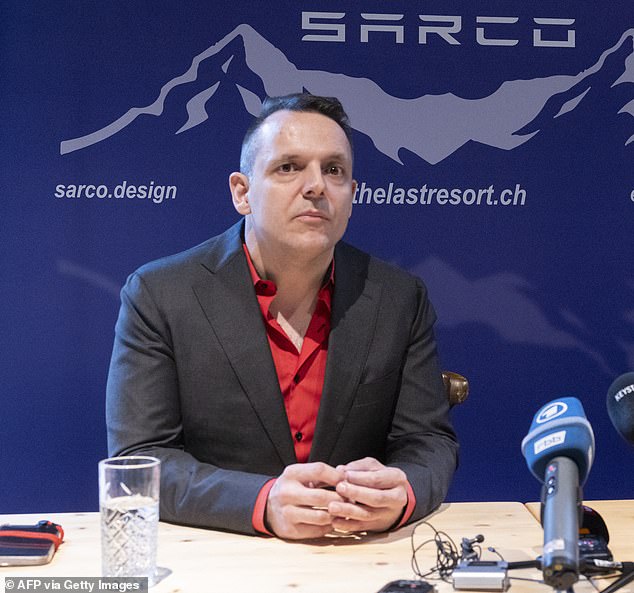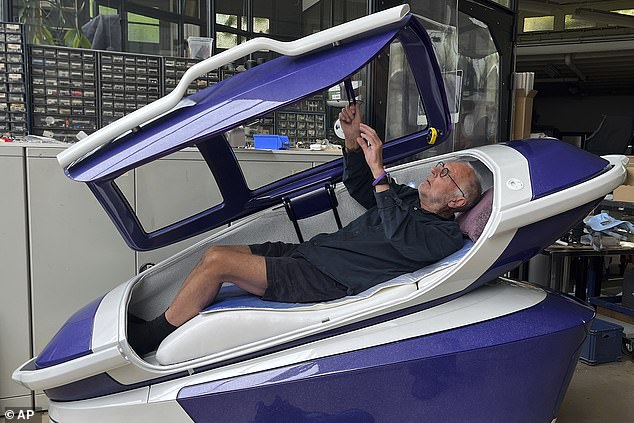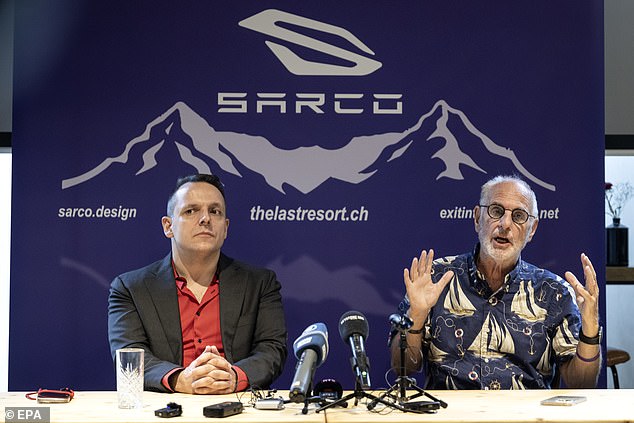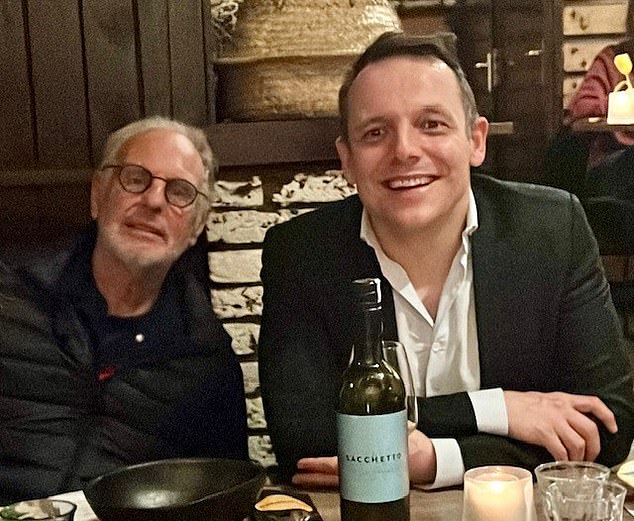Assisted dying campaigner Dr Florian Willet was the only person to witness the first Sarco pod death – watching as a gravely ill American woman entered the suicide machine and pushed a button to end her life.
Her death, triggered when nitrogen gas flooded into the sealed chamber, was successful in the eyes of Willet and Sarco inventor Dr Philip Nitschke, who watched it via video link and described the woman’s passing as ‘peaceful’.
But that day marked the beginning of a dark decline for Willet, who was arrested when dozens of police officers arrived at the scene in northern Switzerland and placed him in pre-trial detention.
The 47-year-old spent ten weeks in a cell, with no contact with his partner Laura Schiesser or anyone else, according to Nitschke.
While there, he discovered he was accused of homicide, with the chief prosecutor raising suspicions that the woman who died in Sarco may have been strangled.
This accusation, which Nitschke and Willet’s organisation The Last Resort said had no foundation, has since been ‘quietly dropped.’
‘It was a disgusting display on the part of the prosecutor, the damage they did to Florian was huge,’ Nitschke told MailOnline.
‘When he was released months later, he was a completely different person. They had broken him during this time,’ Willet’s partner Schiesser said in a statement.
Shortly after he was released from detention in December, Willet was found seriously injured beneath his balcony, in what those close to him say was a failed suicide attempt.
After months in hospital and receiving psychiatric help at a clinic in Zurich, he took his own life on May 5 at a facility in Germany, it was revealed this week.

Dr Florian Willet was the only person to witness the death of an American woman in the nitrogen gas capsule in September

The first use of Sarco capsule took place in the middle of the forest in Switzerland, according to the creators of the device
Now Nitschke and Schiesser have laid the blame for Willet’s deteriorated mental state and death with Swiss authorities.
‘The prosecutors’ very enthusiastic use of pre-trial detention has ended in a tragic way,’ Nitschke said, labelling their treatment of Willet as ‘unscrupulous’.
‘The authorities need to take a close look at themselves, they are the ones who are responsible.’
He said The Last Resort’s lawyers, who were also arrested at the scene of the Sarco death, had not anticipated that police would respond to an assisted suicide – which is legal under certain circumstances in Switzerland – so strongly.
‘Lawyers told us the police would arrive, interview them and let them go home. There had been no expectation of what happened at all,’ Nitschke said.
‘To find yourself suddenly put in pre-trial detention, something they use for murder, must have been traumatising,’ he added.
‘While in detention, [Willet] then heard rumours and saw media reports of possible allegations of homicide. I’m not surprised that it was such a traumatic period.’
Asked whether Willet could have been affected by witnessing the woman’s death, Nitschke said ”I don’ think so.’
‘I talked to him during and after via video link that day. Obviously he wasn’t enjoying the experience, but he’s an extremely experienced person in the area having worked at Dignitas. He was a good person to be there.’
But Willet’s mental decline, which Nitschke described as psychosis, hit him hard after he was released from detention.
‘It was impossible to speak to him, when he came to my office he thought people were pumping in strange gasses under the door, he thought people were listening to him through the phones. He was hallucinating and hearing things,’ Nistchke said.
‘It was episodic psychosis, he was seriously delusional,’ he said, adding that clinicians had provided him with information on Willet’s mental state which supported this.

Philip Nitschke lies down in a ‘suicide pod’ known as ‘The Sarco’ in Rotterdam, The Netherlands, July 8, 2024
‘He wasn’t anything like the person I had known. When he said he was going back to the clinic in Zurich I was pretty pleased.
‘He was showing signs that he was improving, then a few days later things were not better.’
While Nitschke says he was in regular contact with Willet over the past few months, he said he had no longer been the man he once knew.
He had expected to see Willet at a conference in Switzerland in mid-May, but his friend did not turn up.
Willet’s partner said of his final months: ‘He slipped away from his friends more and more and I could hardly get close to him.
‘At some point, I had to realize that I could only be there, but I couldn’t actively help, even if I tried.’

Sarco pod inventor Dr Philip Nitschke (above, right) said the accusations had a hugely damaging effect on Dr Willet after he was freed from police custody

Dr Nitschke (above, left) revealed that the 47-year-old (above, right) had ‘fallen’ from the third floor of his property in Zurich earlier this year, causing him ‘serious damage’
Schiesser added that the once ‘cheerful, humorous’ Willet ‘didn’t want to go on like this’.
She reported him missing last month, and eventually it was discovered that he had passed away.
The Swiss Public Prosecutor’s Office announced on Monday that it would offer its ‘sincere condolences’ to Willet’s relatives and that it would discontinue the criminal case against him related to Sarco.
‘The criminal proceedings against the other defendants will continue,’ the prosecution added.
Nitschke confirmed to MailOnline that he was among those still being investigated in connection with the US woman’s death.
MailOnline has contacted the Swiss Public Prosecutor’s Office for additional comment.

The above map shows where the controversial assisted suicide took place last September which saw Dr Willet arrested
Following allegations of ‘strangle marks’ on the first person to use the Sarco, a person close to Swiss Sarco operator The Last Resort said she had previously been diagnosed with skull base osteomyelitis.
The disease could manifest as an infection of the bone marrow, which could have been responsible for the marks on her neck resembling strangulation marks, the person told Swiss outlet NZZ.
The pod is designed so that the push of a button injects nitrogen gas into the sealed chamber, with the person inside then dying by suffocation within a few minutes.
Before his arrest Dr Willet said he had ‘considered’ suicide at the age of five. His father died by suicide when he was 14 years old and he said he was ‘completely fine with it.’
He added: ‘I was extremely sad because I loved my father. But, I understood immediately my father wanted to do this because he was a rational person, which means that expecting him to remain alive just because I need a father would mean extending his suffering.’
For confidential support, call Samaritans on 116123 or visit www.samaritans.org












